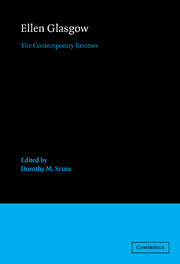Book contents
- Frontmatter
- Contents
- Series Editor's Preface
- Preface
- Acknowledgments
- Introduction
- The Descendant (1897)
- Phases of an Inferior Planet (1898)
- The Voice of the People (1900)
- The Battle-Ground (1902)
- The Freeman and Other Poems (1902)
- The Deliverance (1904)
- The Wheel of Life (1906)
- The Ancient Law (1908)
- The Romance of a Plain Man (1909)
- The Miller of Old Church (1911)
- Virginia (1913)
- Life and Gabriella (1916)
- The Builders (1919)
- One Man in His Time (1922)
- The Shadowy Third and Other Stories (1923)
- Barren Ground (1925)
- The Romantic Comedians (1926)
- They Stooped to Folly (1929)
- The Sheltered Life (1932)
- The Old Dominion Edition of the Works of Ellen Glasgow (1929-33)
- Vein of Iron (1935)
- The Virginia Edition of the Works of Ellen Glasgow (1938)
- In This Our Life (1941)
- A Certain Measure (1943)
- Index
The Ancient Law (1908)
Published online by Cambridge University Press: 04 May 2010
- Frontmatter
- Contents
- Series Editor's Preface
- Preface
- Acknowledgments
- Introduction
- The Descendant (1897)
- Phases of an Inferior Planet (1898)
- The Voice of the People (1900)
- The Battle-Ground (1902)
- The Freeman and Other Poems (1902)
- The Deliverance (1904)
- The Wheel of Life (1906)
- The Ancient Law (1908)
- The Romance of a Plain Man (1909)
- The Miller of Old Church (1911)
- Virginia (1913)
- Life and Gabriella (1916)
- The Builders (1919)
- One Man in His Time (1922)
- The Shadowy Third and Other Stories (1923)
- Barren Ground (1925)
- The Romantic Comedians (1926)
- They Stooped to Folly (1929)
- The Sheltered Life (1932)
- The Old Dominion Edition of the Works of Ellen Glasgow (1929-33)
- Vein of Iron (1935)
- The Virginia Edition of the Works of Ellen Glasgow (1938)
- In This Our Life (1941)
- A Certain Measure (1943)
- Index
Summary
Issac R Marcosson, “A Virginia Valjean,” New York Times Saturday Review of Books, 1 February 1908, pp. 53–4
Between the novelization of bridge whist in the north and the commercialization of race prejudice in the South, all for bestselling purposes, the element of character in fiction has been having something of a struggle for existence. There are occasional evidences, however, that Strenuosity and Timeliness have not yet been permanently installed as dictators, particularly when a new novel by Miss Ellen Glasgow comes along. Her latest story is of such distinguished qualities as to make its consideration not only a matter of personal pleasure, but an occasion for the renewal of faith in a genuine literary artist.
To have watched the growth of Miss Glasgow's art has been to measure a steadily increasing purpose to do large and worthy things, not only in those conventional externals which comprise the mere forms of fiction, but in those larger and more enduring phases, one of which may be summed up as the philosophy of the work. In The Ancient Law Miss Glasgow presents a Virginia Jean Valjean, a man intensely human in his frailties, yet winning in his regeneration. It is a long, weary, beaten road that he travels, and he is but the concrete embodiment of a world-old tragedy and a world-old problem which has survived crumbling ages. What makes him distinct among many of his brothers is an all-encompassing vision that comprehends both the Letter and the Spirit of the Law that enchains him.
- Type
- Chapter
- Information
- Ellen GlasgowThe Contemporary Reviews, pp. 117 - 130Publisher: Cambridge University PressPrint publication year: 1992



